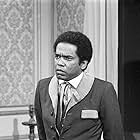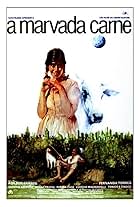Do quarto dos fundos de um bordel, o bandido conhecido como Rainha Diaba controla a distribuição de drogas na cidade. Ao saber que um de seus homens está prestes a ser preso, ele resolve "fa... Ler tudoDo quarto dos fundos de um bordel, o bandido conhecido como Rainha Diaba controla a distribuição de drogas na cidade. Ao saber que um de seus homens está prestes a ser preso, ele resolve "fabricar" um novo bandido para enganar a polícia.Do quarto dos fundos de um bordel, o bandido conhecido como Rainha Diaba controla a distribuição de drogas na cidade. Ao saber que um de seus homens está prestes a ser preso, ele resolve "fabricar" um novo bandido para enganar a polícia.
- Direção
- Roteiristas
- Artistas
- Prêmios
- 3 vitórias no total
Yara Cortes
- Violeta
- (as Iara Cortes)
- Direção
- Roteiristas
- Elenco e equipe completos
- Produção, bilheteria e muito mais no IMDbPro
Avaliações em destaque
It is nice to see a gangster film with a war between past partners full of betrayals in a decaying Rio de Janeiro. Actors perform well, particularly Milton Gonçalves and Nelson Xavier. The prostitute played by Odete Lara explored (both psychologically and economically) by the pimp played by Stepan Nercessian is very depressing, just as reality is in those situations. However, dialogues and art direction are too much kitsch, unconvincing, cheap... they did bother me. By the way, a queer gangster as the boss is interesting, but it is extremely loosely inpired by famous Madalena Satã, being not really comparable to Madalena Satã movie from 2002. Anyway, it is nonsense, as I have seen, to consider that this 1974 movie by Antônio Carlos de Fontoura is a better film or a better representation of Madalena Satã than the film directed by Karim Aïnouz and played by Lázaro Ramos in the leading role. In addition, I may mention that in Rainha Diaba there is a torture scene that I just do not know what to think about. Torturers had a lot of fun doing that, and the movie was made during brutal military dictatorship, that tortured with the very same methods. Indeed, I do not know if I consider it an unbearable lack of empathy to portray torture that way, or if I take it as a fierce critic as torturers were just the opposite of how regime repressive agents wanted to be seen. To resume, I summarize the film in one sentence: what if Almodovar and Tarantino made together a Pornochanchada?
In Lapa, Rio de Janeiro, the homosexual drug dealer lord Rainha Diaba (Milton Gonçalves) decides to find a scapegoat to save his lover from the jail for traffic with students. His gang, under the command of Catitu (Nelson Xavier), uses the young pimp Bereco (Stepan Nercessian), but he escapes from the police siege and decides to break and rob the points where Rainha Diaba sells his marijuana, initiating a bloody war against the powerful dealer.
"A Rainha Diaba" is a very violent Brazilian movie of the 70's, in the underworld of Rio de Janeiro, and awarded in many Festivals. The kitsch atmosphere, associated with a brilliant work in the lighting, is ahead of time, and Pedro Almodóvar used this style mostly in his first movies. The gore story, about a cruel homosexual marijuana dealer, is full of betrayals, shootings, travesties and prostitution, and was awarded as follows: (1) Prêmio de Qualidade INC ("Quality Award INC") / 1974 (Coruja de Ouro "Golden Owl"); (2) Instituto Nacional de Cinema ("National Institute of Cinema") / 1974 (Best Actor: Milton Gonçalves); (3) VIII Prêmio Air France de Cinema ("VIII Air France Award of Cinema") / 1974 (Best Actor: Milton Gonçalves); (4) Prêmio APCA Associação Paulista de Críticos de Arte ("APCA Award Paulista Association of Art Critics") / (Best Actress: Odete Lara / Whole Work); (5) VIII Festival de Brasília do Cinema Brasileiro ("VIII Brasília Festival of Brazilian Cinema") / 1975 (Best Actor: Milton Gonçalves / Best Cinematography: José Medeiros / Best Music Score: Guilherme Vaz). This movie participated also in the following festivals: (1) Cannes Festival / Quinzaine des Réalisateurs (France, 1974); (2) San Sebastian Cinema Festival (Spain, 1975); (3) 80 Ans de Cinema Brésilien Centre Pompidou (France, 1978); (4) Black Roots, Racines Noires (Milan, Italy & Paris, France 1999).
The DVD is one of the best I have, with excellent extra material, including interviews, making of, trailer, posters and additional footages. Just as a curiosity, Milton Gonçalves was very promoted in his career by this movie, but he was the third choice of director Antonio Carlos da Fontoura. His other two first options refused the role of Rainha Diaba, afraid with the repercussion of such a corrupted and evil character. There are excellent information and curiosities in the Extras of this DVD. My vote is nine.
Title (Brazil): "A Rainha Diaba" ("The Devil Queen")
"A Rainha Diaba" is a very violent Brazilian movie of the 70's, in the underworld of Rio de Janeiro, and awarded in many Festivals. The kitsch atmosphere, associated with a brilliant work in the lighting, is ahead of time, and Pedro Almodóvar used this style mostly in his first movies. The gore story, about a cruel homosexual marijuana dealer, is full of betrayals, shootings, travesties and prostitution, and was awarded as follows: (1) Prêmio de Qualidade INC ("Quality Award INC") / 1974 (Coruja de Ouro "Golden Owl"); (2) Instituto Nacional de Cinema ("National Institute of Cinema") / 1974 (Best Actor: Milton Gonçalves); (3) VIII Prêmio Air France de Cinema ("VIII Air France Award of Cinema") / 1974 (Best Actor: Milton Gonçalves); (4) Prêmio APCA Associação Paulista de Críticos de Arte ("APCA Award Paulista Association of Art Critics") / (Best Actress: Odete Lara / Whole Work); (5) VIII Festival de Brasília do Cinema Brasileiro ("VIII Brasília Festival of Brazilian Cinema") / 1975 (Best Actor: Milton Gonçalves / Best Cinematography: José Medeiros / Best Music Score: Guilherme Vaz). This movie participated also in the following festivals: (1) Cannes Festival / Quinzaine des Réalisateurs (France, 1974); (2) San Sebastian Cinema Festival (Spain, 1975); (3) 80 Ans de Cinema Brésilien Centre Pompidou (France, 1978); (4) Black Roots, Racines Noires (Milan, Italy & Paris, France 1999).
The DVD is one of the best I have, with excellent extra material, including interviews, making of, trailer, posters and additional footages. Just as a curiosity, Milton Gonçalves was very promoted in his career by this movie, but he was the third choice of director Antonio Carlos da Fontoura. His other two first options refused the role of Rainha Diaba, afraid with the repercussion of such a corrupted and evil character. There are excellent information and curiosities in the Extras of this DVD. My vote is nine.
Title (Brazil): "A Rainha Diaba" ("The Devil Queen")
As mentioned by other reviewers, "A Rainha Diaba" is striking in its visual design, costumes, and sense of place. These elements are one of the film's clear strengths.
Another great strength is in the film's understanding and depiction of the underworld. A vast percentage of the world's film and television is based on crime drama, but very little is realistic in portraying the social dynamics of crime. "A Rainha Diaba" is a great exception to this, and is realistic and believable in building society.
There are two big problems with the film as well however.
In the first place, the plot of the film is basically not compelling, and fails to engage the viewer. The ending in this regard is particularly unsatisfactory, being both emotionally unsatisfying, and unrealistic.
In the second place, much of the acting is unconvincing and fails to engage the viewer. Some people may be able to overlook these flaws, but those looking for a great story or absorbing entertainment should look elsewhere.
Another great strength is in the film's understanding and depiction of the underworld. A vast percentage of the world's film and television is based on crime drama, but very little is realistic in portraying the social dynamics of crime. "A Rainha Diaba" is a great exception to this, and is realistic and believable in building society.
There are two big problems with the film as well however.
In the first place, the plot of the film is basically not compelling, and fails to engage the viewer. The ending in this regard is particularly unsatisfactory, being both emotionally unsatisfying, and unrealistic.
In the second place, much of the acting is unconvincing and fails to engage the viewer. Some people may be able to overlook these flaws, but those looking for a great story or absorbing entertainment should look elsewhere.
If you're Brazilian you know how films made in the 70's were. They used to be about things like sex, violence and drugs. This was probably the worst time of cinema in Brazil. But many movies could be saved from the trash of the seventh art. "Rainha Diaba" is one of these films.
The main character is Diaba, a homossexual who who dresses like a lady. He controls the bandits and drug dealers of an area of Rio de Janeiro thorough violence and threats. He is feared and even loved by the people who work for him. However some of his men decide they could take the power from Diaba's hands and they try to make a plot to do it. It's an old film, but we can see some actors who are famous in Brazil today, like Milton Gonçalves, Nelson Xavier and Stephan Nercessian.
my rate 6 /10
The main character is Diaba, a homossexual who who dresses like a lady. He controls the bandits and drug dealers of an area of Rio de Janeiro thorough violence and threats. He is feared and even loved by the people who work for him. However some of his men decide they could take the power from Diaba's hands and they try to make a plot to do it. It's an old film, but we can see some actors who are famous in Brazil today, like Milton Gonçalves, Nelson Xavier and Stephan Nercessian.
my rate 6 /10
A curio from Brazil, ostensibly THE DEVIL QUEEN is a rinky-dink internecine power usurpation within a drug kingpin's clique, set in the seedy Lapa neighborhood of Rio de Janiero, but it is its plucky and colorful depiction of the less-shown counterculture which sustains its cult renown.
More tallying with camp aesthetics than a homoerotic tantalizer, the film's title is a sobriquet of the drug lord (Gonçalves), who is black and queer, sentimental and merciless. In order to protect one of his pretty-face underlings, who sells drugs to students, he requests Catitu (Xavier) to look for a whipping boy to take the blame, and Catitu lays his eyes on Bereco (Nercessian), a small-time pimp of Isa Gonzalez (Lara, paired with Nercessian who is only half of her age, gives the best impression of a good-hearted working girl).
Bereco is hot-blooded, credulous and reckless, he is oblivious of Catitu's ulterior motive and wallows in the fast money from their dangerous escapade, when finally the police force knocks on his front door, Bereco barely escapes and goes into hiding, leaving Isa wounded and heartbroken. But Catitu has his own plan to eradicate the Devil Queen once and for all and subsequently convinces all other underlings, but no one has the guts to be the executioner, so Catitu needs Bereco to do one last job for him, rubbing out the Queen. His plan almost works as he plans, but one can never know who is harboring a bigger ambition to gobble up the entire cake for one's own pleasure, the ending is as ludicrous as the wantonly spewed fake blood.
However, there is a jovial kindred spirit in the scenes where the Queen organizing a drag party in his residence, a miscellany of kaleidoscopic characters slinking amid each other and blatantly vaunts their unification to help the beleaguered Queen, whereas in a less salubrious front, it is a cheap move poking fun at the sadist torture inflicted on a shrieking Ida. For all the film's tongue-in-cheek temerity, Milton Gonçalves emotes with a staggering impression jumping from an authoritarian maniac to a chirpy, cutesy maiden and Nelson Xavier is really in his elements when it comes to duplicity and wheedling.
In a nutshell, laced with a psychedelic soundscape and a garish palette, Antonio Carlos da Fontoura's THE DEVIL QUEEN is an antiquated mish-mash of queer grandstanding and gangster subterfuge, with high voltage of panache and mischief in its trashy artery.
More tallying with camp aesthetics than a homoerotic tantalizer, the film's title is a sobriquet of the drug lord (Gonçalves), who is black and queer, sentimental and merciless. In order to protect one of his pretty-face underlings, who sells drugs to students, he requests Catitu (Xavier) to look for a whipping boy to take the blame, and Catitu lays his eyes on Bereco (Nercessian), a small-time pimp of Isa Gonzalez (Lara, paired with Nercessian who is only half of her age, gives the best impression of a good-hearted working girl).
Bereco is hot-blooded, credulous and reckless, he is oblivious of Catitu's ulterior motive and wallows in the fast money from their dangerous escapade, when finally the police force knocks on his front door, Bereco barely escapes and goes into hiding, leaving Isa wounded and heartbroken. But Catitu has his own plan to eradicate the Devil Queen once and for all and subsequently convinces all other underlings, but no one has the guts to be the executioner, so Catitu needs Bereco to do one last job for him, rubbing out the Queen. His plan almost works as he plans, but one can never know who is harboring a bigger ambition to gobble up the entire cake for one's own pleasure, the ending is as ludicrous as the wantonly spewed fake blood.
However, there is a jovial kindred spirit in the scenes where the Queen organizing a drag party in his residence, a miscellany of kaleidoscopic characters slinking amid each other and blatantly vaunts their unification to help the beleaguered Queen, whereas in a less salubrious front, it is a cheap move poking fun at the sadist torture inflicted on a shrieking Ida. For all the film's tongue-in-cheek temerity, Milton Gonçalves emotes with a staggering impression jumping from an authoritarian maniac to a chirpy, cutesy maiden and Nelson Xavier is really in his elements when it comes to duplicity and wheedling.
In a nutshell, laced with a psychedelic soundscape and a garish palette, Antonio Carlos da Fontoura's THE DEVIL QUEEN is an antiquated mish-mash of queer grandstanding and gangster subterfuge, with high voltage of panache and mischief in its trashy artery.
Você sabia?
- CuriosidadesThe film was part of the Official Selection of the Cannes - Director's Fortnight 1974.
- ConexõesFeatured in Tudo Que É Apertado Rasga (2019)
- Trilhas sonorasEstrada do Sol
Composed by Dolores Durán and Antonio Carlos Jobim
Principais escolhas
Faça login para avaliar e ver a lista de recomendações personalizadas
- How long is The Devil Queen?Fornecido pela Alexa
Detalhes
Contribua para esta página
Sugerir uma alteração ou adicionar conteúdo ausente

Principal brecha
By what name was A Rainha Diaba (1974) officially released in Canada in English?
Responda

























